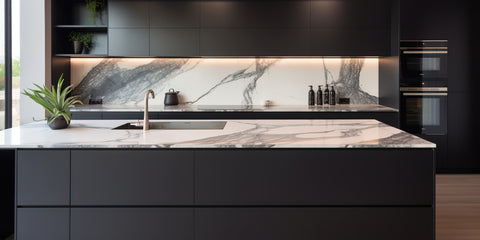Most popular
Is Counter Quartz Man-Made? Know What Makes Them Different
Quartz countertops have grown in popularity in recent years due to their enduring durability, low maintenance, and stunning beauty. While quartz countertops resemble natural stone, the manufacturing process has been specifically designed to augment or even surpass the natural characteristics of materials such as granite or marble. In this blog, we will delve into the process of how quartz countertops are manufactured and why choosing quartz over other materials could be a great decision for your home.

How are Quartz Countertops made?
Quartz countertops last long, are easy to maintain and are simply stunning. A common question about them is, 'Is quartz man made?'

Quartz slabs are made using technologies like Bretonestone Technology. This technology is behind the creation of the finest slabs. Bretonstone technology refers to a patented process for manufacturing engineered stone products, such as quartz surfaces, using a combination of natural quartz aggregates and polymer resins.
The Manufacturing Process of Quartz

1) Extraction: Quartz is a mineral that is found naturally and is mined and treated. The typical method for obtaining quartz is open-pit mining.
2) Mixing: Quartz needs to be cleaned after the extraction process to remove all the impurities. The aggregates are made up of natural quartz (usually over 90% by weight) combined with acrylic or polyester resins, color pigments, and other additives. To ensure uniform distribution, the mixture is thoroughly mixed.
3) Vacuum Vibro-compression: The mixed material is then poured into a mold and compacted under vacuum conditions to remove air bubbles and ensure proper adhesion of the resin to the quartz particles.
4) Heating: The firming stage is done under a heat lamp to harden the mixture and develop its durability. After the curing is completed, the mixture is cut into slabs.
5) Cooling: A clamp is used to hold these slabs upright and cool them for a couple of hours after the curing process is complete. The slabs are now properly leveled and trimmed.
6) Polishing: The next stage of the manufacturing process is polishing the slabs, which is the final step; this involves using machines with increasingly fine abrasives to achieve the desired finish. Typical finishing options include high-gloss, honed, or frosted. Enhanced aesthetic appeal and versatility make engineered stone suitable for countertops, flooring, walls, and more.
Why Use Quartz Over Other Materials?
-
Quartz is more durable than most natural stones, as it is less likely to scratch or chip.
-
Quartz does not require any sealing since it is a non-porous material, so daily cleaning is easy.
-
Quartz is available in a wide range of colors and styles that mimic natural stones such as granite or marble.
-
Quartz is less expensive than marble, but with the same luxurious appearance.
In conclusion, quartz countertops are a perfect combination of strength, durability, and beauty. Therefore, investing in quartz countertops is a wise decision when it comes to your home's functionality and aesthetics.
Explore our Quartz Catalog
Empty content. Please select category to preview
Join our newsletter now
Promotions, new products and sales. Directly to your inbox.





